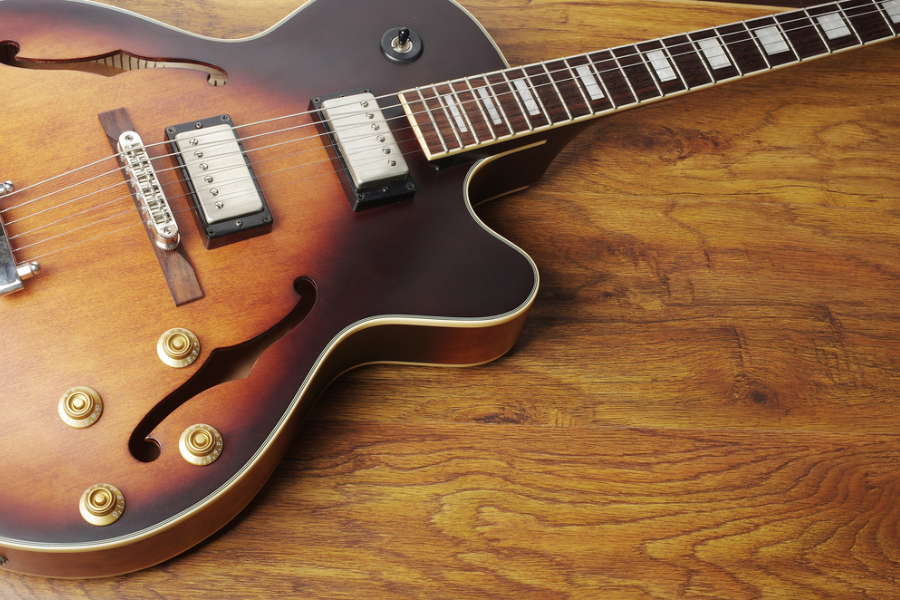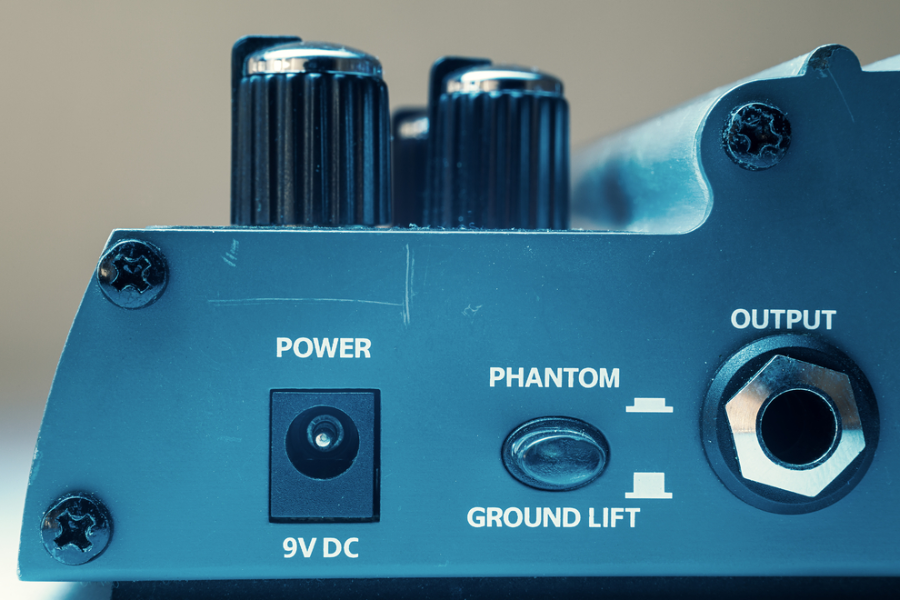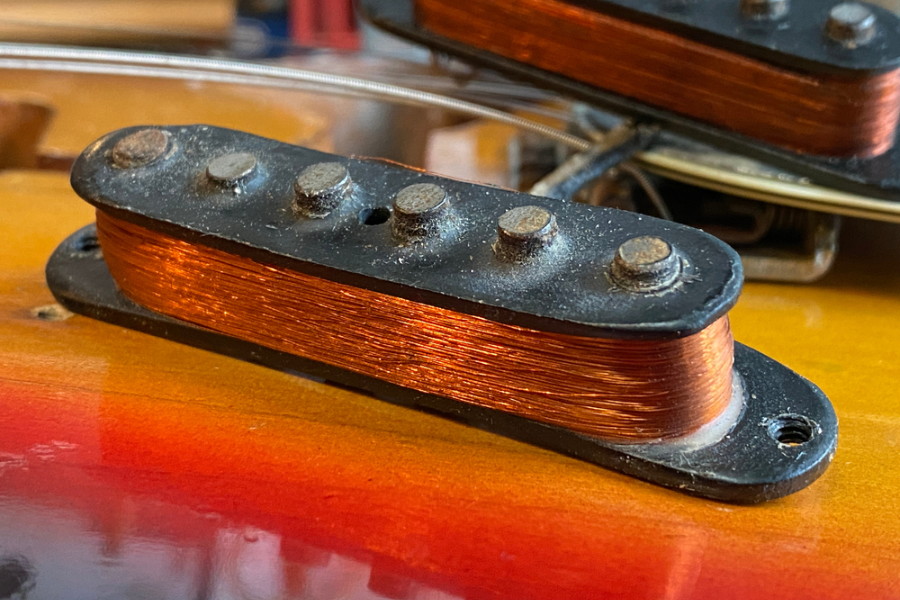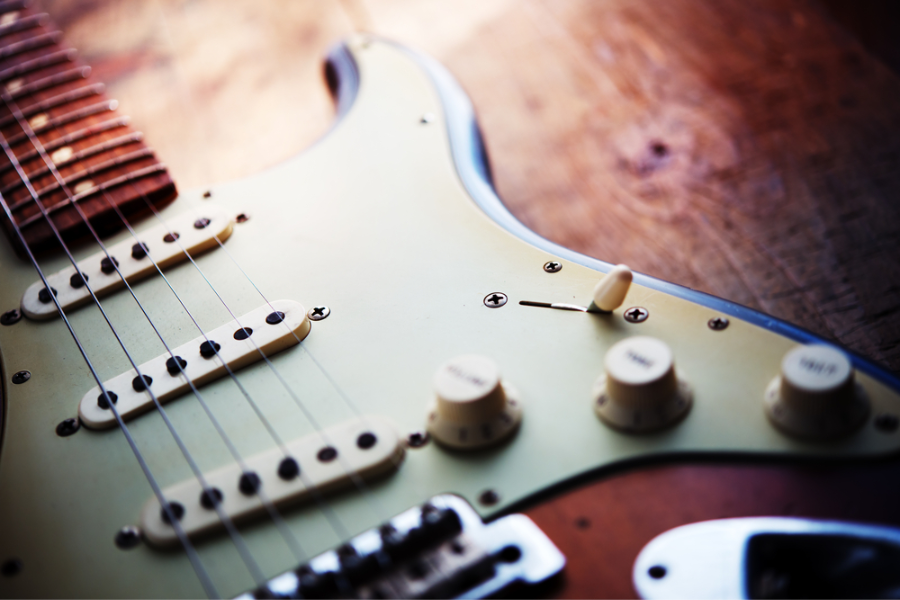After playing your best performance, you want a clean and bolt end but as you pause, a pesky buzz intrudes, shattering the silence. This issue of electric guitar buzzing when not touching strings can ruin your playing experience and offend your listeners. Where’s that noise coming from? This sound is annoying and confusing, but it is not uncommon.
This article aims to eliminate electric guitar buzzing with our simple fixes. Read on with Eguitarmania and learn more about the causes and solutions to this problem. Good news! We’re going to share some simple tips and tricks that anyone can follow. We’re going to make sure that the only thing buzzing around here is your excitement at playing your guitar without any unwanted noises.
Common Causes of Electric Guitar Buzzing When Not Touching Strings And Potential Fixes
Let’s discuss details about the primary causes and their fixes. We make sure it is easy to understand, and clear to follow.

Faulty Amp
A faulty amp can be a significant source of frustration for electric guitar players, leading to buzzing when not touching the strings. Buzzing could also be the result of a problem within the amplifier or the electrical outlet that it’s plugged into.
Such as electrical grounding problems, component wear and tear, or interference from other devices. Such a fault can degrade the quality of sound, detracting from the clarity and purity that musicians strive for.
Naturally, an outlet with faulty or no grounding will cause problems with other electrical devices, too. For instance, you may even notice that the noise stops as appliances near you stop working, including fridges or any type of ACs.
Common Signs and Effects of a Faulty Amp
- Hum or Buzz: A steady buzz or hum when the instrument is not being played is another sign. Noise varying in volume in the amp’s circuits can sometimes mean that there are problems with grounding or interference.
- Distorted Sound or No Sound: When an amplifier isn’t working properly, you could hear distortion or, worse, no sound at all. You could notice this, especially if you leave the guitar plugged in but are not playing.
- Overheating: Overheated amplifiers are another common source of buzzing. If the device is overheating, it might be because some of its internal components are malfunctioning and failing to process the signal properly.
Solutions for a Faulty Amp
Eliminate Ground Loops: Ground loops are a common cause of buzzing sounds. Making sure everything was properly grounded and using ground loop isolators turned out to be a game-changer for me.
Inspect and Replace Tubes: Start by inspecting the amp’s tubes for signs of wear or damage, such as cracks or discoloration. Replacing faulty tubes can often rectify buzzing noises and improve sound quality.
Check for Environmental Interference: External factors like radio signals and electromagnetic fields can affect the amp’s circuitry. I realize moving the amp to a different location or using shielded cables can reduce interference.
Furthermore, you will learn about it over time as you play. Once you have selected the right configuration settings, the buzzing sound will disappear, and your guitar will start sounding as it is supposed to.
Guitar Grounding Issues
When it comes to electric guitar buzzing when not touching the strings, one prevalent cause that I’ve encountered is Guitar Grounding Issues. It’s particularly prevalent in less expensive guitars.
This problem occurs when the electrical signal from the guitar isn’t effectively directed to the ground, which can lead to an annoying buzz or hum in your guitar’s output.
Grounding issues can come from various factors, including improper wiring, poor soldering connections, or inadequate shielding within the guitar’s control cavity. These issues can manifest as persistent noise, including hum and buzz, and in some cases, even total signal loss, severely affecting the guitar’s performance.
Common Signs & Effects of Grounding Issues
The most noticeable sign of grounding issues is a constant buzzing sound that becomes apparent when the guitar strings are not being touched. This buzzing noise indicates that the guitar is picking up interference from electrical sources, which is then being directed into the guitar’s signal.

If you don’t ground your guitar correctly, you might end up with an electric shock rather than just a little annoyance. Although usually not dangerously high, the shock can still be quite unpleasant. In extreme cases, poor grounding can even lead to equipment damage.
You can tell if your guitar is properly grounded if there’s no buzz and you don’t experience any slight shocks upon touching the strings. The absence of these issues means that your guitar’s electrical signal is being effectively directed to the ground, ensuring clear sound output without unnecessary noise.
Solutions for Fixing Grounding Issues
- Inspection and repair: Start by inspecting the wiring and soldering joints for any visible damage or poor connections. Re-solder any loose or damaged connections to ensure they are secure.
- Star Grounding: Star grounding minimizes noise and ground loops by directing all ground connections to a single point. For this method to work, you need to link all of the guitar’s grounds to one central location, such as the back of the volume pot or any other ground point in the circuit.
- Use a Multimeter: Use a DC Resistance multimeter to detect grounding issues. Test each ground connection by connecting one probe to a ground point and the other to guitar metal components. “0.0” denotes a strong connection, whereas “0.L” indicates a fractured ground route. This technique identifies the grounding problem, enabling targeted fixes.
- Improve Shielding: Shielding the control cavity with conductive materials like copper or aluminum foil can help block interference from external sources. Make sure all shielding is properly grounded to create an effective barrier against noise.
To fix grounding problems on an electric guitar, you need to know a few basic things. But if you have the right tools and follow a plan, you can greatly reduce or get rid of buzzing sounds. For these fixes, it’s always best to talk to a skilled guitar tech if you don’t feel safe doing them yourself.
Single-Coil Pickups
Single-coil pickups are electromagnetic interference (EMI), which is great at picking up noise. In settings where there is a lot of electromagnetic interference, single-coil pickups may be troublesome because they function like antennae and take up noise from their surroundings.
In the early days of electric guitars, there weren’t as many electrical gadgets, therefore this interference is more common now.

Common Signs & Effects of Single-Coil Pickups
The most straightforward test for grounding issues related to single-coil pickups is to touch the strings or any other metal part of the guitar. If the buzzing noise diminishes or stops entirely, it’s a clear sign of a grounding issue.
This problem isn’t limited to the strings but can affect all metal parts connected to the guitar’s electronics, such as pickups, pickup screws, potentiometers, the bridge, and tuning pegs. This buzzing can be accompanied by other noises, like popping sounds, which may occur at regular intervals.
Solutions for Single-Coil Pickups
- Using Hum Eliminator Pedals: This might be handy for folks who seek an easier choice without changing their instrument. These pedals balance audio and break-loop antennas. This eliminates 60Hz cycle hum without modifying guitar tone.
- Shielding the Guitar: Covering the strings and electronics center with copper tape reduces interference. This creates a Faraday cage around the devices, reducing outside interference. All protective materials need adequate grounding.
- Upgrading to Noiseless Pickups: Manufacturers provide noiseless single-coil pickups that mimic the sound of a single-coil pickup without the hum. These pickups employ stacked coils to reduce electromagnetic interference while maintaining single-coil pickup quality.
- Noise Blocked pedals: Set a volume level that ends the sounds. This setting instantly turns off hum and buzz. The guitar sound is the same. This helps you stay calm throughout pauses or extended notes.
It is well-known that single-coil pickups sometimes hum, but these approaches provide many ways to reduce this annoying noise so that guitarists can still enjoy the distinctive sound of these pickups.
Expert Tips and Advice for Non-Buzz Guitar
Let us share some advice, insights, and personal experiences on tackling different issues:
Gaining too much
Every guitar player understands that high gain settings increase sound and noise. Lowering the gain is the first practical approach to eliminating hum. If the problem persists with reduced gain or clear tones, we have a deeper issue.
If the hum disappears with humbuckers and a clean tone, your guitar’s electronics are picking up interference or having grounding issues. Increasing the loudness of a clean tone while still hearing hum indicates additional difficulties, not only gain settings.
Interference with RF
Radio frequency (RF) interference plagues electric guitars. As you indicated, unstable power or TVs might cause it. You should adjust your setting away from these interference sources. Each musician should attempt it for separation and removal. Sometimes moving your instrument and amp fixes the issue. Sometimes you need to add extra power to the room.

Different Shields and Cases
Adding a shield to a partially shielded guitar may not fix the issue. The bridge plate and copper-plated steel reflector plate conceal the bridge pickup in the Telecaster’s distinctive design. However, too much insulation, particularly around the coil, increases capacitance and changes tone.
Grounding solutions
It’s very creative to connect the shielded copper wire to a metal bar and ground it outside. This strategy is ideal for older buildings with substandard plumbing. These demonstrate how far artists will go for sound. These procedures are dangerous; therefore, it’s preferable to perform them with a professional electrician.
Listening from Users: Telecaster sound
Electric guitar noise, particularly with a Telecaster, may be challenging due to its construction and sensitivity to interference. It’s impossible to safeguard this pickup without affecting its famed sound, but that’s part of the Telecaster’s allure. Noiseless pickups that mimic single-coil tones without the hum may be a choice for quieter playback.
In conclusion, a combination of practical troubleshooting and understanding your instrument’s unique characteristics can help avoid this problem.
Final Thoughts
The most important thing is to be patient and try different things until you discover what works best for your setup; some approaches may be more effective than others. Before making any changes to your electrical system, be sure everyone is safe.









